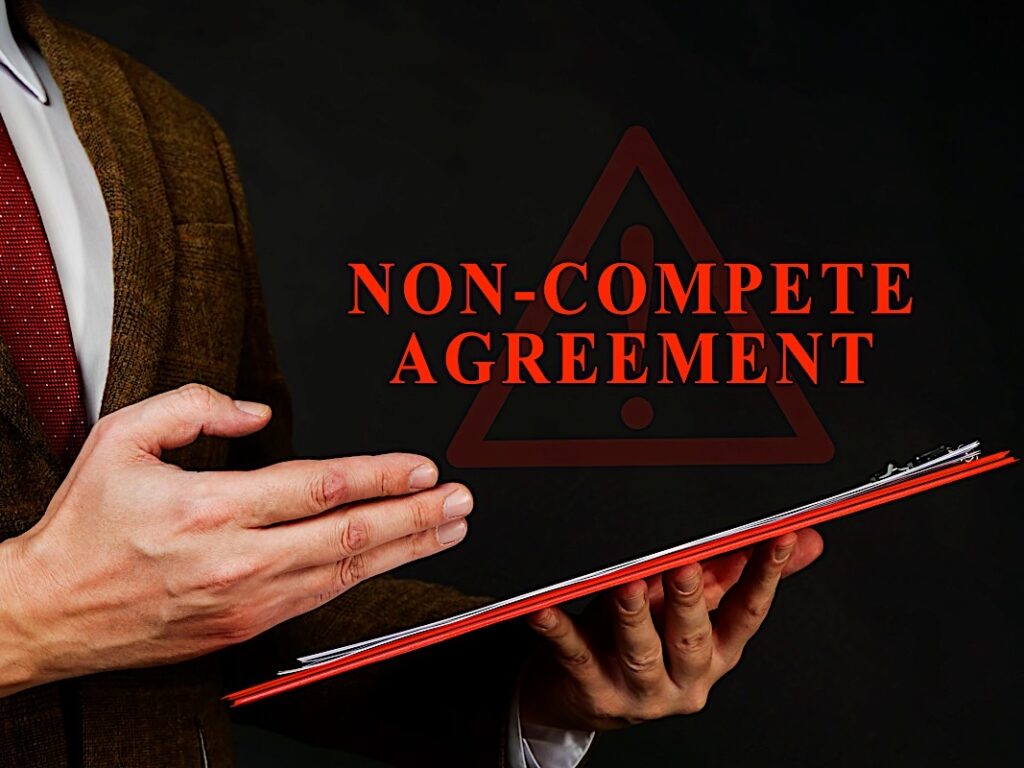
HR Management Guide: Navigating Unenforceable Non-Compete Clauses in Ontario
The non-compete clause in the Employment Agreement may no longer be enforceable, although it’s in flux and varies by region. Employers are not permitted to issue non-compete agreements to their employees in Ontario (with some exceptions). In the US, the FTC has issued a “final rule” barring the use of non-compete clauses—although Dallas district Judge Ada E. Brown temporarily blocked the ban, and a decision this week (August 21) makes that injunction permanent and nationwide in scope in the U.S.
In Ontario, they remain unenforceable (as of December 2021). We’ve put together a handy guide to “what HR Managers need to know.”
NOTE: Seek legal advice on this topic. Subject to change, as the rules keep shifting. This post offers no legal advice, and is only intended to inform HR Managers and employees.
Quick Facts
- Ontario banned non-compete clauses for most employees in October 2021
- Non-compete clauses in Ontario are only enforceable for most executives
- The Federal Trade Commission (FTC) proposed a rule in January 2023 to ban non-compete clauses in the US.
- In September the FTC implemented the Ban, however…
- In July a Texas Judge struck down the FTC ruling
- As of August, the FTC’s ban is pending appeal
- In Ontario, with the exception of executives, a ban on non-compete for employees remains the rule.
- HR managers need to review and possibly revise existing employment agreements if they haven’t already.
- Non-compete clauses are often challenged in court and can be deemed unenforceable
- The argument in favor of banning non-compete contracts or clauses: “Without reform, employers will continue to cause irreparable harm to their employees by paying them less, blocking their ability to pursue their careers elsewhere, and throttling entrepreneurship.” (Source Bloomberg>>)
- The argument against banning: “arbitrary and capricious” and would cause “irreparable harm.” (Source Bloomberg>>)
- Ontario and some states ban non-competes for employees.

Ontario Exceptions
According to the Ontario information page on non-compete agreements, “There are two exceptions to non-compete agreements being prohibited under the ESA:
The first exception applies where all the following occur:
- there is a sale or lease of a business or a part of a business that is operated as a sole proprietorship or a partnership
- immediately following the sale, the seller becomes an employee of the purchaser
- as part of the sale, the purchaser and seller enter into an agreement that prohibits the seller from engaging in any business, work, occupation, profession, project or other activity that is in competition with the purchaser’s business after the sale
The second exception applies to executives:
- The ESA does not prohibit employers from entering into non-compete agreements with executives. An executive is any person who holds the office of:
- chief executive officer
- president
- chief administrative officer
- chief operating officer
- chief financial officer
- chief information officer
- chief legal officer
- chief human resources officer
- chief corporate development officer
- any other chief executive position
Quick Statistics
- In Ontario, non-compete clauses are banned for employees earning less than $75,000 annually
- 30% of US workers have signed non-compete agreements
- FTC estimates that banning non-compete clauses could increase wages by $300 billion per year
- Only 10% of non-compete agreements are contested in court
- Non-compete clauses can reduce job mobility by 20%
The Legal Landscape: Non-Compete Clauses in Ontario
Recent legislative shifts have dramatically altered the enforceability of non-compete clauses within Ontario. As of October 2021, amendments to the Employment Standards Act, 2000 (ESA) now prohibit employers from including non-compete clauses in employment contracts. This change stems from the recognition that such clauses often hinder economic mobility and the ability for employees to seek better opportunities.
However, there are specific exceptions. Notably, this prohibition does not apply to individuals in executive roles, such as C-suite executives, nor does it relate to the sale of a business where the seller agrees to a non-compete as part of the transaction. These exceptions underscore the legislation’s focus on protecting the majority of the workforce while maintaining allowances for high-level executives and business transactions where non-competes may be more justifiable.
For HR managers, it’s crucial to understand that existing non-compete clauses in contracts signed before the amendments can still pose significant legal risks. Employers must issue a notice to employees, informing them that the non-compete clause in their contract is no longer enforceable under provincial law. Failure to comply with these notice requirements could result in potential legal challenges and penalties.
Amid these changes, HR professionals must revisit their employment contracts and policies to ensure they align with the new legal landscape. Proactively updating these documents not only ensures legal compliance but also fosters a more transparent and fair working environment for employees.
Best Practices for HR Managers
As non-compete clauses become unenforceable, HR managers need to adopt new strategies to retain talent and protect their company’s interests. Here are some best practices to consider:
Focus on Employee Engagement and Retention
Investing in your employees’ professional development and creating a positive work environment can significantly reduce turnover rates. Offer opportunities for career growth, provide constructive feedback, and foster a culture of recognition and appreciation.
Strengthen Non-Disclosure and Non-Solicitation Agreements
While non-competes may be off the table, non-disclosure (NDA) and non-solicitation agreements (NSA) are still viable tools. Ensure these agreements are clear, specific, and tailored to protect sensitive business information and client relationships without restricting employment opportunities.
Identify Key Roles and Tailor Contracts Accordingly
Differentiate between senior executives and other employees. Tailored contracts that focus on specific roles and responsibilities help in aligning the company’s needs with legal guidelines. For senior executives, consider including stricter NDAs and NSAs as part of their contractual obligations.
Enhance Onboarding and Training Programs
A thorough onboarding process helps set the tone for new hires, making them feel valued and integrated from the start. Coupled with continuous training programs, this approach not only improves employee satisfaction but also enhances their skills and loyalty to the company.
Invest in Human Capital
Consider employee benefits not just as perks, but as strategic investments. Comprehensive health benefits, retirement plans, and other well-being initiatives can make your company an attractive place to work, thereby reducing the lure of competitors.
Regularly Review and Update HR Policies
Stay proactive by continuously reviewing and updating your HR policies to align with the evolving legal landscape. This ensures compliance and helps in safeguarding your business interests.
Training Your HR Team: Understanding Non-Compete Clause Legislation
Empowering your HR team with a comprehensive understanding of non-compete clause legislation is essential. This knowledge ensures your business remains compliant and fosters fair employment practices. Given the recent changes both in Ontario and the US, it’s more important than ever to stay ahead of the curve.
Ideally, ensure your HR team is well-versed with the specific laws pertaining to non-compete clauses in your jurisdiction. This includes understanding exceptions, the criteria that render non-competes unenforceable, and the scope of permissible agreements. Providing access to professional legal advice can be invaluable in deciphering complex legislative language and its implications.
Interactive Workshops and Seminars
One effective method to enhance your HR team’s understanding is through interactive workshops and seminars. These sessions should cover the basics of non-compete clauses, recent legislative changes, and real-world case studies to illustrate points effectively. Such sessions not only educate but also offer a platform for HR professionals to ask questions and clarify doubts.
Legal Alerts and Continuous Learning
Subscribe to legal alerts from reliable sources. These alerts keep your team updated on any sudden changes or impending legislation relevant to non-compete clauses. Encourage a culture of continuous learning where HR professionals regularly review current laws and policies, ensuring they stay updated with the latest developments.
Role-Specific Training
Tailor training programs based on the roles within your HR team. For instance, those handling onboarding may need deeper insights into permissible clauses in employment contracts, while those dealing with employee exits might benefit more from training about enforceability and legal implications during employment termination.
By investing in comprehensive training, you not only ensure compliance but also establish a foundation for fair and transparent practices within your organization. Equip your HR team with the right tools and knowledge so they can navigate the complex landscape of non-compete clauses effectively.


 Our HR solutions experts can recommend the right mix of HR outsourced services to make your entry into Canada easier.
Our HR solutions experts can recommend the right mix of HR outsourced services to make your entry into Canada easier.  Pivotal Employment Management Services co-hires your workforce, simplifying entry of your business in Canada.
Pivotal Employment Management Services co-hires your workforce, simplifying entry of your business in Canada. 















